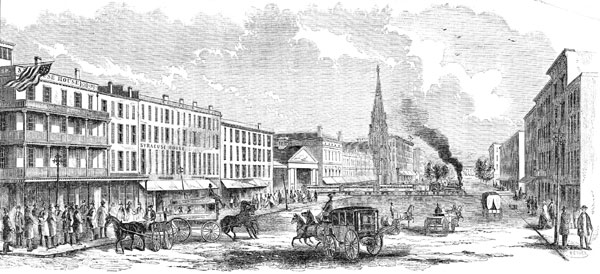
On February 23rd, 1861, President Abraham Lincoln arrived in Washington D.C. to end his pre-inaugural trip. At this point, seven states had already seceded from the Union since Lincoln was elected. Additionally, the threat of a civil war grew with each passing day along with the threat of his assassination, leading to Allen Pinkerton, head of a private detective agency, to plan a way to safely get Lincoln to Washington D.C. The following comes to us via the History Channel.
“Lincoln agreed to the covert arrival. With Pinkerton and Ward Hill Lamon, his former law partner, Lincoln slipped out of the hotel in Harrisburg on the evening of February 22. He wore a soft felt hat instead of his customary stovepipe hat, and draped an overcoat over his shoulders and hunched slightly to disguise his height. The group boarded a sleeper car and arrived in Baltimore in the middle of the night. They slipped undetected from the Calvert Street station to Camden station across town. There, they boarded another train and arrived without incident in Washington at 6 a.m. On the platform, the party was surprised when a voice boomed, “Abe, you can’t play that on me.” It was Congressman Elihu B. Washburne, a friend of Lincoln’s from Illinois. Washburne escorted Lincoln to the Willard Hotel.”
Lincoln’s journey across the country included stops in New York, one of which was Syracuse on February 18th. However, due to the crowds that met him at other stops, Lincoln only stopped in cities such as Rochester and Utica for about 5 minutes, though Syracuse did enjoy a bit longer of visit.
The following excerpt is from the website Mr Lincoln and New York:
“Mr. Lincoln’s remarks from a platform Syracuse were more extensive. They were delivered in front of the Globe Hotel:
‘I see you have erected a very fine and handsome platform here for me and I presume you expected me to speak from it. If I should go upon it you would imagine that I was about to deliver you a much longer speech than I am. I wish you to understand that I mean no discourtesy to you by thus declining. I intend discourtesy to no one. But I wish you to understand that though I am unwilling to go upon this platform, you are not at liberty to draw any inferences concerning any other platform with which my name has been or is connected. [Laughter and applause.] I wish you a long life and prosperity individually, and pray that with the perpetuity of those institutions under which we have all so long lived and prospered, our happiness may be secured, our future made brilliant, and the glorious destiny of our country established forever. I bid you a kind farewell.’
“At Syracuse a crowd estimated at 10,000 people was assembled to receive Mr. Lincoln. The special train arrived at Utica ahead of time and was awaited by thousands of people who were standing in a snowstorm.”

